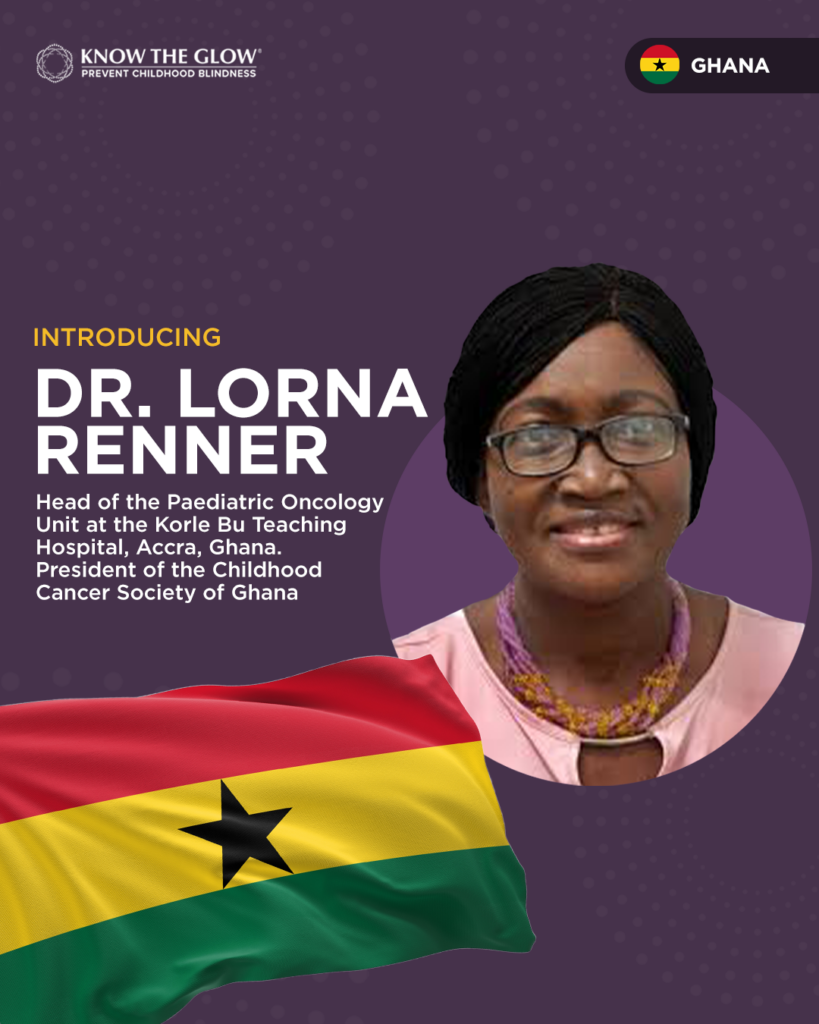Dr. Lorna Renner has long been one of the most determined voices in Ghana’s fight against childhood cancer, tirelessly working to bring better care to countless young lives. She’s deeply committed to making sure every family in Ghana has the right resources, medications, and access to treatment. This deep commitment and her impactful work recently came to light in a conversation with the KnowTheGlow team, including Co-Founder Megan Webber, Director of Global Outreach, Helene Dameris, and Programs Manager for Africa, Ruth Ngaruiya.
Dr. Lorna Renner’s journey into pediatric oncology began during her time as a junior resident at Korle Bu Hospital, where she worked on the ward treating childhood cancers, primarily Burkitt lymphoma. Realizing the urgent need for expertise to manage other childhood malignancies, she was inspired to specialize further. This path led her to the UK, where she had the opportunity to pursue pediatric oncology training at the Royal Hospital for Sick Children in Edinburgh.
Her impact extends far beyond her clinical work. One of the key initiatives she has helped lead is the twinning program between Ghana and the Royal Hospital for Sick Children in Edinburgh.With support from World Child Cancer, this program organizes crucial workshops that bring together diverse medical teams from all over Ghana, from Accra to Kumasi, all focused on improving how childhood cancers are diagnosed and managed. These workshops, covering everything from nursing care to medical treatments, are incredibly important for empowering health workers in smaller, regional facilities. They allow pediatricians to handle childhood cancer cases, including retinoblastoma, much more effectively, even when there isn’t a specialist pediatric oncologist around. This sharing of knowledge and mentorship has been absolutely crucial for spreading quality care across the entire country.
Building on years of this solid groundwork, a major step forward has been the recently launched Mahama Cares Foundation Project, which seeks to make care for non-communicable diseases such as Childhood cancers including retinoblastoma, more accessible
Dr. Renner, through the Childhood Cancer Society of Ghana and in partnership with World Child Cancer and the Ghana Health Service, has consistently led nationwide awareness training efforts. Teams have gone to all 16 regions of Ghana, giving health workers the knowledge they need to spot the first signs of childhood cancers, including that tell-tale glow of retinoblastoma.
Dr. Renner strongly believes that retinoblastoma screening simply must be a part of regular child health services. “Children go for weighing from two weeks of age up to two and a half years, monthly,” she points out. “There should be no excuse why children’s eyes aren’t examined.” This vital focus has really started to get significant attention at the national level. Ghana’s involvement in the global platform for childhood cancer medicines promises to significantly improve access to essential treatments, taking away a major hurdle for families.
She’s particularly encouraged by the Ministry of Health’s deep engagement now. Dr. Renner clearly sees the immense value in KTG’s educational materials, which will be essential for training parents in a project called COMPASS which will help with spotting early warning signs and making sure families get referred for care quickly. This innovative project actually trains parents of childhood cancer survivors to become “navigators” right in their own neighborhoods. As Dr. Renner explains, “Parents are in the community,” emphasizing their unique ability to notice early warning signs and guide other families to the right healthcare facilities.
Innovative communication methods are also proving essential. The fact that WhatsApp groups allow parents to share experiences through voice messages is a great example of an adaptable and inclusive way to communicate, making sure language barriers don’t stop important information from getting through. This kind of forward thinking combined with a dedication to using every tool available, from the Arclight for early screening to broad awareness campaigns, truly creates a powerful drive for positive change in Ghana’s battle against childhood cancer.

